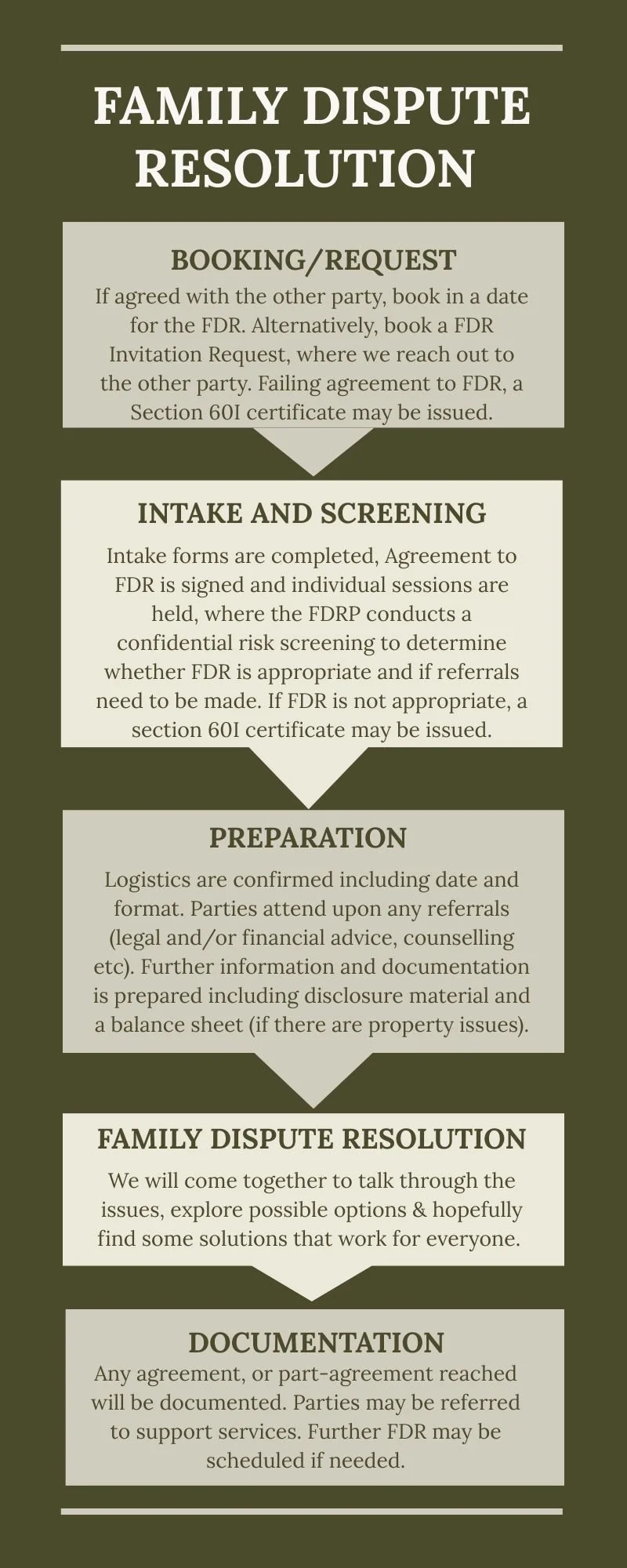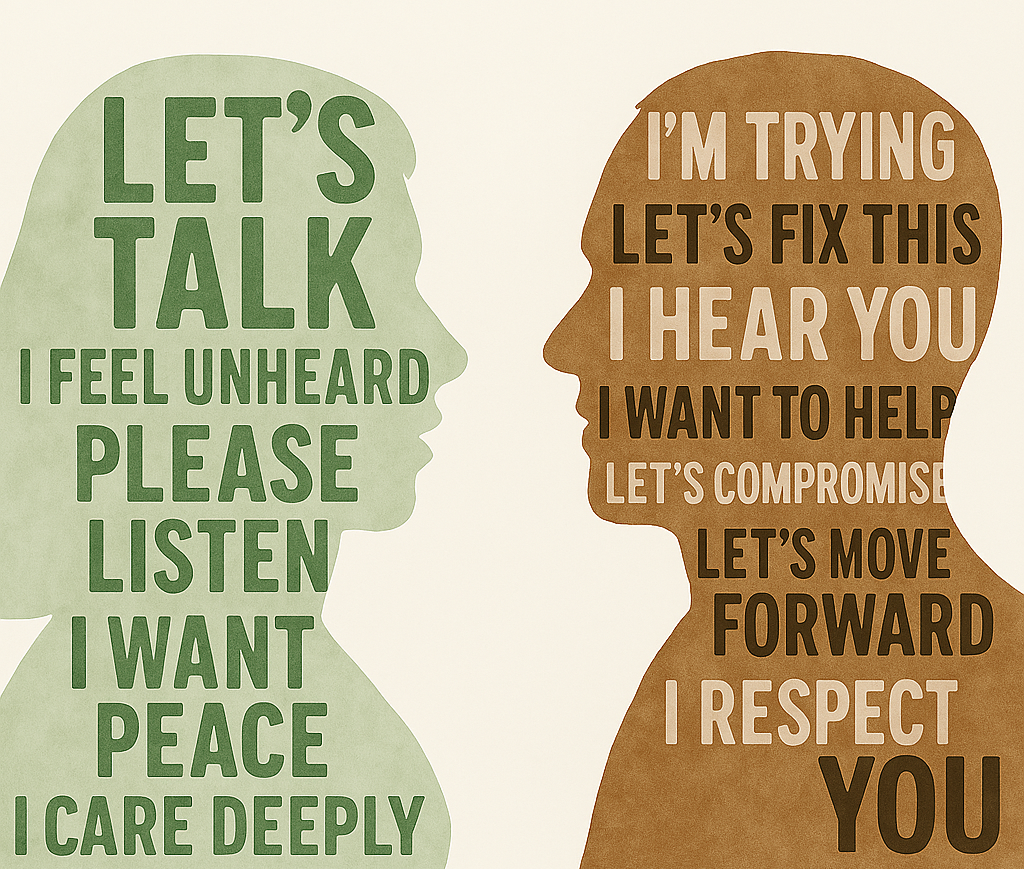Family Dispute Resolution
Family Dispute Resolution (FDR) is a specialised form of mediation designed to help separating or separated families resolve disputes, particularly around parenting arrangements, property division, and financial matters including spouse and child support, without going to court, or to bring to an end current litigation.
It is a structured, confidential process facilitated by a neutral third party known as a Family Dispute Resolution Practitioner (FDRP).
FDR focuses on helping families communicate more effectively, explore options, and reach agreements that are practical, child-focused, and tailored to their unique circumstances.
In most parenting matters, Australian law requires parties to make a genuine effort to resolve disputes through FDR, with a FDRP before applying to the court, which is evidenced via a section 60I certificate issued by a FDRP.
Olivia Koorey is fully accredited by the Attorney-General’s Department and brings extensive training in mediation and negotiation. In addition to her FDR qualifications, she is an experienced Family Lawyer and has a background in Psychology, offering deep expertise in both the legal and relational aspects of family conflict.
Frequently Asked Questions about Family Dispute Resolution
-
Both Mediators and Family Dispute Resolution Practitioners (FDRPs) help people resolve disputes through structured, facilitated conversations, but they differ in their qualifications and legal authority.
A Mediator is a neutral third party trained in conflict resolution who facilitates dialogue between individuals or groups. Mediators work across many areas, such as workplace, commercial, community, and family disputes, and help parties reach voluntary agreements. However, they do not have the legal authority to issue certificates required for court proceedings in family law matters.
A FDRP is a Mediator with specialised accreditation under the Family Law Act 1975 (Cth). FDRPs are authorised to:
Mediate parenting and family law disputes
Conduct risk assessments for family violence or safety concerns
Issue Section 60I certificates, which are required before parties can apply to the court for parenting orders (except in limited circumstances)
To become an accredited FDRP in Australia, practitioners must meet the requirements set out in the Family Law (Family Dispute Resolution Practitioners) Regulations. This includes:
Completing a Graduate Diploma of Family Dispute Resolution (or an approved equivalent qualification)
Holding a relevant tertiary qualification in law, psychology, social work, mediation, or a related field
Undertaking a supervised 50-hour work placement in an FDR setting
Obtaining professional indemnity insurance
Passing a national police check and meeting child safety clearance requirements
Having access to a suitable complaints mechanism
Applying for accreditation through the Attorney-General’s Department and being listed on the national FDR Register
In short, all FDRPs are Mediators, but not all Mediators are FDRPs. If you're navigating separation or parenting arrangements, working with an accredited FDRP ensures your mediation meets legal requirements and is tailored to family dynamics.
-
The FDR process when facilitated by an accredited FDRP offers a range of benefits including:
Legally recognised – FDRPs are authorised to issue Section 60I certificates, which are required before applying to court for parenting orders (unless an exception applies)
Child-focused – FDRPs are trained to keep children’s best interests at the centre of discussions
Safe and supported – Practitioners conduct risk assessments and can offer shuttle or video conferencing formats to ensure emotional and physical safety
Cost-effective – FDR is significantly less expensive than litigation
Timely – Matters are often resolved more quickly than through the court system
Empowering – Parties retain control over decisions, rather than having outcomes imposed by a judge
Improves communication – FDRPs help parties listen, understand, and express their needs constructively
Preserves relationships – Especially important for ongoing co-parenting, FDR fosters cooperation and reduces long-term conflict
Confidential – Discussions are private and cannot be used in court, with limited exceptions for safety concerns
Flexible – Sessions can be conducted in person, online, or via shuttle format depending on your needs
Less stressful – FDR offers a calmer, more respectful environment than adversarial court proceedings
Timely – FDR can be organised quickly, often resulting in faster outcomes than court proceedings
Research-informed – Research suggests that the majority of participants in FDR reach full or partial agreement, reaching an agreement significantly reduces future acrimony between parties and FDR participation (even if an agreement is not reached) improves adjustment to separation & communication for many and reduces acrimony for high-conflict clients who were expecting to go to court.
-
The Family Law Act 1975 (Cth) requires that all persons who have a dispute about parenting matters make a genuine effort to resolve that dispute by Family Dispute Resolution before commencing Court proceedings for a parenting order.
There are some exceptions to this requirement, and at all times we are considering whether Family Dispute Resolution is the right process for your circumstances.
The Federal Circuit and Family Court of Australia (Family Law) Rules 2021 (Cth) also requires prospective parties to a property proceeding in the Federal Circuit and Family Court of Australia to make a genuine effort to resolve the dispute prior to filing an application to commence court proceedings.
Additionally, in the exercise of its general powers of case management, the Court may order parties attend Family Dispute Resolution.
-
A Section 60I certificate is a formal document issued by an accredited Family Dispute Resolution Practitioner (FDRP) under the Family Law Act 1975 (Cth). It confirms that parties have made a genuine effort to resolve their parenting dispute through Family Dispute Resolution (FDR), or that FDR was not appropriate or unsuccessful.
In most cases, you must obtain a Section 60I certificate before applying to the Federal Circuit and Family Court of Australia for parenting orders. The certificate does not include detailed information about the mediation but simply records the outcome, such as:
One party refused or failed to attend
The matter was assessed as unsuitable for FDR
Both parties attended and made a genuine effort
One or both parties did not make a genuine effort
The process began but was discontinued part-way through
Section 60I certificates are valid for 12 months and are a legal requirement unless an exemption applies (e.g. urgency, family violence, or incapacity).
At Olivia Koorey Mediation & Family Law, we are accredited to conduct FDR and issue Section 60I certificates when appropriate. We’ll guide you through the process with clarity, care, and professionalism.
-
In some cases, families may choose a child-inclusive model of FDR, where a qualified child consultant meets with the children separately to understand their views, feelings, and experiences. The consultant then shares insights with the parents during FDR, to help guide decision-making in a child-focused way.
This process is:
Voluntary – Parents must agree to include children
Age and maturity dependent – Not all children are suitable for direct involvement
Conducted by trained professionals – Child consultants are skilled in working with children in family law contexts
Focused on wellbeing – Children are never placed in a decision-making role or exposed to conflict between parents
At Olivia Koorey Mediation & Family Law, we recognise the importance of ensuring children’s voices are heard in a safe and meaningful way and we can support you in engaging a qualified child consultant as part of a child-inclusive Family Dispute Resolution process in appropriate circumstances.
-
FDR is a flexible process that can be tailored to suit your circumstances. Sessions can take place in person or via secure video conferencing, depending on what feels most comfortable and accessible for you.
You can choose to be in the same room, whether physical or virtual, or opt for shuttle mediation, where the FDRP moves between parties separately. This format can be helpful when direct communication feels too difficult or unsafe.
We are committed to creating a safe, respectful space, wherever and however you choose to engage.
-
It is possible to bring your lawyer or a support person to FDR. Having someone by your side can help you feel more confident, supported, and informed throughout the process.
Lawyers can provide legal advice and assist with reviewing any agreements reached. Support people, such as a trusted friend, family member, or professional, can offer emotional reassurance and help you stay grounded.
We encourage you to make choices that support your wellbeing and help you participate meaningfully. Just let us know in advance so we can ensure the process runs smoothly for everyone involved.
-
Our fees are set out here. This cost is usually shared equally with the other party unless otherwise agreed.
-
We offer two flexible options:
Video Conferencing – A convenient and accessible option for all clients.
In-Person – Held at a mutually agreed location within the Sydney metropolitan area, such as a solicitor’s office or a hired venue. We can provide you with a list of venues to choose from.
Travel within the Sydney metropolitan area is included in the cost of our full-day FDR. If a venue is hired, the cost is typically shared equally between the parties.
For clients located interstate, overseas, or in regional areas, we recommend video conferencing. However, travel arrangements can be explored on request, with associated costs to be covered by the clients.
-
Olivia brings a unique blend of expertise, empathy, and professionalism to every FDR. With a background in psychology and postgraduate qualifications including an Honours and Master of Laws (majoring in Family Law), she offers deep insight into both the legal and emotional dimensions of family conflict.
As a Nationally Accredited Mediator, Family Dispute Resolution Practitioner, Parenting Coordinator, and Collaboratively trained Practitioner, Olivia is equipped to guide families through complex and sensitive issues with clarity and care. Her approach is child-focused, ethically grounded, and tailored to support respectful communication and lasting outcomes.
Whether you're navigating separation, property alteration, parenting arrangements, child support or broader family dynamics, Olivia provides a safe, structured space to help you move forward—confidently and constructively.
-
A healthy co-parenting relationship is built on mutual respect, clear communication, and a shared commitment to your child’s wellbeing. Here are some key indicators:
Open and respectful communication – Parents speak calmly, listen actively, and avoid defensiveness or blame
Consistency – Routines and expectations may differ between households, however this is respected by the other parent and there is consistency in each household so children know what to expect
Flexibility and compromise – Parents adapt to changes and support each other when plans shift
Joint decision-making – Both parents collaborate on important choices about education, health and activities
Mutual respect – Each parent acknowledges the other’s role and avoids criticism, especially in front of the child
Unified front – Children see their parents working together, which reinforces stability and emotional safety
Boundaries and privacy – Personal lives are kept separate, with a focus on parenting matters
Emotional support and appreciation – Parents recognise each other’s efforts and show gratitude
Conflict resolution skills – Disagreements are handled constructively, with a focus on solutions
Child-centred focus – Decisions and interactions prioritise the child’s needs above personal differences
These signs reflect a cooperative, respectful environment that helps children thrive emotionally and developmentally.


